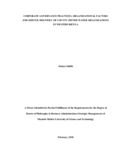CORPORATE GOVERNANCE PRACTICES, ORGANIZATIONAL FACTORS AND SERVICE DELIVERY OF COUNTY OWNED WATER ORGANIZATIONS IN WESTERN KENYA
Abstract
Corporate governance practices enable organizations to achieve their objectives
through better decision making, effective use of scarce resources and good service
delivery. County owned water organizations in Western Kenya may have good
governance practices but the extent to which they are implemented influence service
delivery. The main objective of the study was to find out the influence of corporate
governance practices, organizational factors and service delivery among county owned
water organizations in Western Kenya. In order to achieve this purpose, it was
hypothesized that internal auditing, transparency and accountability, ethical
framework and CSR, have no statistical significant effect on service delivery. It was
also hypothesized that organizational factors have no moderating effect on the
relationship between independent and dependent variables. The study was guided by
Stakeholder Theory as postulated by Freeman and employed both descriptive and
correlational survey designs. Study area included Amatsi, Nzoia and Kakamega water
and sanitation companies and data was obtained from directors, managers and
employees working in the organizations, and customers, who gave additional
information on service delivery. Yamane formula was used to determine sample size
for respondents and sampling done by stratified, simple random sampling method.
Data was collected using self-administered semi structured and structured
questionnaires and interview guides. Reliability, validity, normality and
multicolinearity, were tested using Cronbach’s alpha, pilot study, Shapiro Wilk and
variance inflation factor respectively. Data analysis was done using descriptive
statistics of frequencies and percentages, and inferential statistics which included
Pearson’s Correlation Coefficient that was used to find out the association between
corporate governance practices and service delivery, Simple Linear Regression was
used to analyze the first four objectives. Multiple Regression was tested for statistical
significant effect between corporate governance practices and service delivery.
Hierarchical Regression Analysis was used to find out the moderating effect of
organizational factors on the relationship between corporate governance practices and
service delivery and interview data was analyzed qualitatively. Data is presented in
form of tables and charts and the findings of Pearson correlation coefficients indicated
that there existed associations between individual and combined corporate governance
practices and service delivery among county owned water organizations in Western
Kenya. Transparency and accountability had the highest influence on service delivery,
followed by CSR and internal auditing while ethical framework had the least. Results
of Simple and Multiple Regression Analysis indicated transparency and
accountability, and CSR had statistical significant effect on service delivery.
Hierarchical Regression Analysis findings showed that organizational size and culture
moderated the relationship between independent and dependent variables however,
collective organizational factors did not moderate the relationship. The study
recommended adoption of corporate governance practices by organizations in order to
ensure that there is improved service delivery. It is hoped that the findings will benefit
stakeholders in Kenya such as county and national government, customers, donors,
researchers among others

